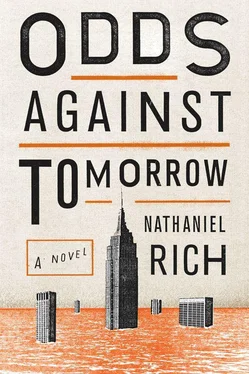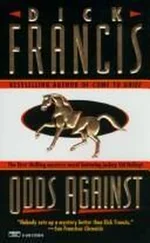“I guess I shouldn’t be surprised.”
“He wasn’t a true believer.”
“He was a salesman. He believed in that.”
“Just wait till we start our own firm,” she said. “He’ll never know what hit him.”
“Judging by his phone messages, I think he’s starting to get a pretty good idea.”
“Future Days,” said Jane. “Where there’s life, there’s no hope.”
“Future Days,” said Mitchell. “No prophet is accepted in his own country.”
“No. That’s not a proper one. Was that scripture?”
“Future Days,” said Mitchell. “Foresight is always twenty-twenty.”
“We’re going to have to work on those.”
Mitchell walked to the windows.
“Don’t fall, please,” called Jane from the couch.
“The structure at least seems solid, though.”
“I have no idea. It’s stone. Isn’t it the stone house that the big bad wolf can’t blow down?”
“Well it’s not the straw house, or the one made of sticks.”
But from this height you could see that it was exactly straw and sticks that had saved the Canarsie Bank Trust. Across from the building, on the other side of Flatlands Avenue, lay a long marsh, a dense scrabble of destroyed trees and dried brush. It was two blocks wide and extended some six avenues long, until it touched the sea. The entire acreage was clogged with trash and plaster and splintered shingles, which meant that the marsh had done its job: it had buffered the winds and the rising water.
And so the Canarsie Bank Trust was a real castle; it even had a moat.
* * *
They began in the outer rooms. The wood floor was still damp. Beneath the windows a pattern of mold — black and green polka dots — had begun to climb the wall. There was a sharp, rotten odor, and they soon found the source: a toad, its flat green head crowned with glass shards and fragments of sash. Using a hard manila folder as a shovel, Mitchell scooped the carcass off the floor and flopped it out the window.
“If this were cleaned up,” said Jane as they began to pick the branches and muddy tufts of grass off the floor, “it wouldn’t make a bad temporary office for Future Days.”
The sunlight, hitting the broken glass, cast prismatic shapes across the floor — rhombuses, triangles, diamonds. The breeze, washing through the room in a continuous flow from the sea, flushed out the scent of the dead frog. Through the windows you could see clear to the ocean. Even the Belt Parkway, which crossed the far end of the marsh, was still visible in the sunlight, though its platform was still a foot underwater. A furry animal with a bouncier gait than a dog was jogging along Flatlands Avenue. Was that a fox? Mitchell had never seen a fox. “It wouldn’t make a bad office,” said Jane, “if it weren’t in the middle of a postapocalyptic wasteland.”
She chucked a clump of moss out the window.
It was a warm day, and they were sweating, but the work was satisfying. It was brainless, mechanical labor and you could chart your progress by comparing the amount of dirt inside the offices with the amount on the street below. Jane was smiling at him.
“What?” said Mitchell.
“You look … different.”
“Like strong? From the canoeing?”
“No. Like confident,” she said, but there was something bittersweet in her smile. “Like happy.”
“Aren’t you happy? Isn’t it a relief to be off that island?”
“Manhattan? Or Randall’s?”
“Well, both. But especially Randall’s.”
“Yes.” But she wasn’t looking at him anymore. Her fingers palpated the surface of a long maple desk that was dappled with white water spots. She began rubbing away at one of these spots. This was not particularly useful — the water spots were the least of their problems. Nor was she making much progress, though she seemed to be putting significant effort into it. It would be more helpful to get started on, say, the birdshit stalagmites. But Mitchell sensed it was best not to interfere. He was doing more of that, he found. Sensing. Less logic, more intuition. He wasn’t confident that it was working.
Once they were down to their last two cans of water they went to find Hank Cho at his church. It was about fifteen blocks away, but blocks no longer made sense as a unit of measurement — the distance was shorter because now you could walk diagonally through the grid. Hank was waiting for them on the stairs outside. There was a peculiar, stretched expression across his face. Mitchell realized it was the first time he had ever seen Hank grin.
“I found it,” said Hank. He was rocking from one foot to the other like a kid who had to pee.
“Found what?” said Jane.
“Jackpot!”
* * *
Jackpot Eastern Market Supply was an enormous cement warehouse near the corner of Flatlands and Pennsylvania, about a mile east of the Canarsie Bank Trust. It had been run by a Chinese import agency that specialized, apparently, in everything. Square sections of ceiling had collapsed in the storm, and the warehouse had partially flooded. The merchandise on the shelves closest to the ground was mush, leaching a chromatic array of industrial dyes that pooled on the cement floor. But the pillars of sunlight lancing through the ceiling at least allowed them to see. As Hank led them down an aisle they passed parcels of fish food, copper pots, propane stoves, knife sets, beach towels. Mitchell stepped over a torn bag of fertilizer that had been colonized by a scraggly beard of orange moss.
“Is there an organizing principle here?” said Mitchell.
“It’s in alphabetical order,” said Hank. He handed beach towels to Jane and Mitchell. “In Chinese.”
They smelled it before they could see it. And before they could smell it, they could feel it — on their faces, in their eyes. Their eyes filled.
“Put them on,” said Hank. He demonstrated the technique with his own towel.
They emerged into an open section of floor, where thousands of cans and sealed bags of food and plastic water jugs were stacked on pallets in magnificent towers that rose to the ceiling. It was a city of food. That was the good news. The bad news: the back wall was lined with freezers. They had been thawing for nearly a week. Sludge, the color of kidneys, oozed gently from the vents. White worms pullulated within the freezers. You could see them churning, pushing against the glass panels.
Hank, pressing the towel firmly across his face, pointed to a set of shopping carts and then to the towers of cans. “Get going,” he said, his voice muffled by the terry cloth. “Before we run out of time.” They looked at the bank of freezers. One of the doors was beginning to bulge.
* * *
Outside Mitchell heard a violent heaving. He found Jane around the corner, several yards down the side of the warehouse, her forehead against the wall. A plastic water jug was on the ground next to her, half empty.
“Just leave me,” she said.
“Here. Take this.”
She glanced quickly at him, but when she saw the towel she recoiled, as if he’d offered her a scorpion. Shuddering, she covered her mouth.
“It’s the smell,” she gasped. “It’s an atrocity.”
“Where?”
“It’s on the towel. It’s on you .”
He had already become used to it. After the reek of sewage in flooded Manhattan and the mold in their trailer on Randall’s Island, what was a little rotting meat?
“I’m leaving,” she said.
“Wait a minute.”
“No.” She turned to face him. Her hair hung in loose clumps; her eyes were strained. “I’m going back.”
“Just stay outside — I’ll handle the rest of the shopping.”
“And then what?”
“And then,” he said. “Well—”
“You want to stay here. In this .” She waved at the littered expanse, the dirt fields.
Читать дальше












